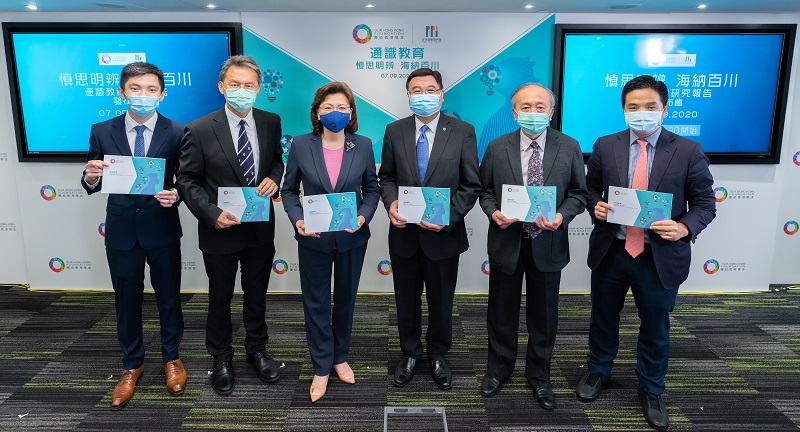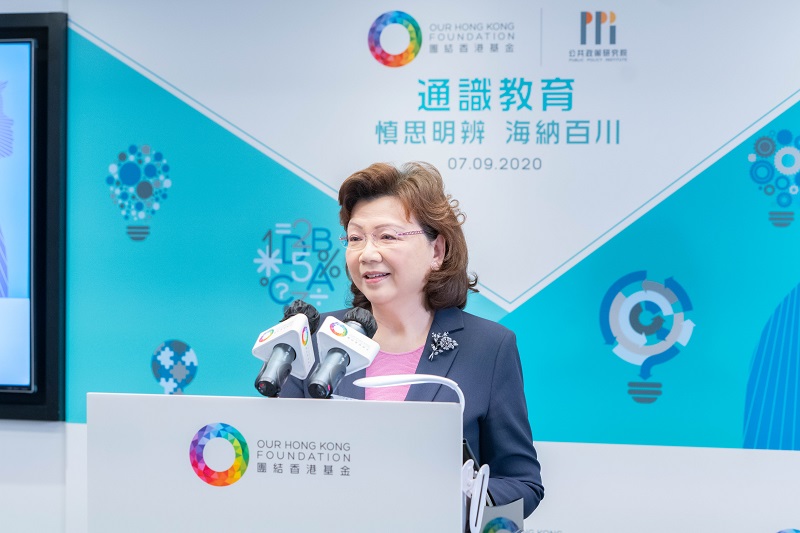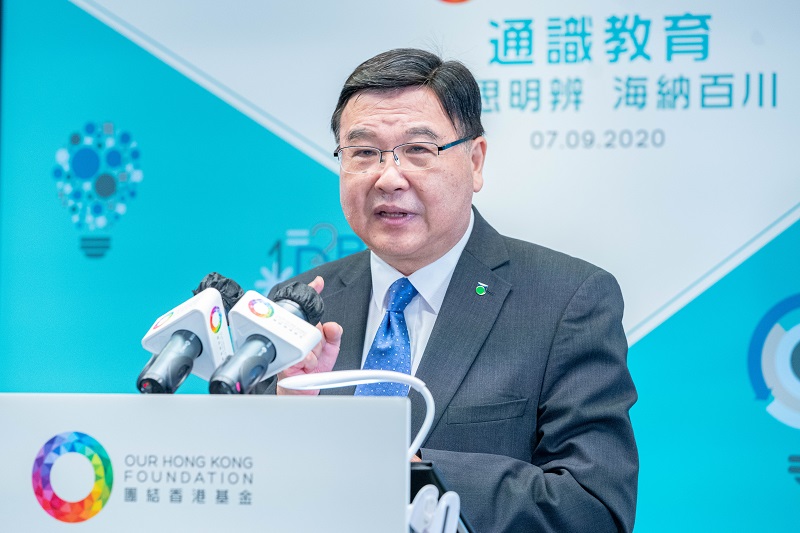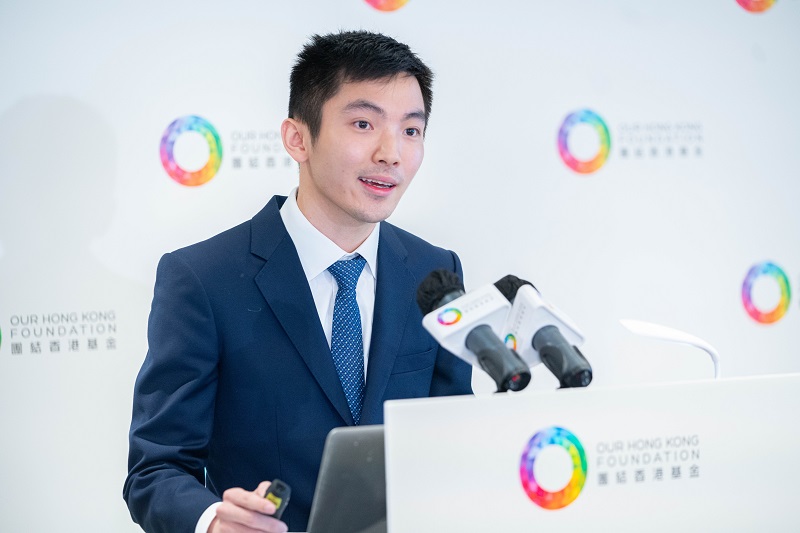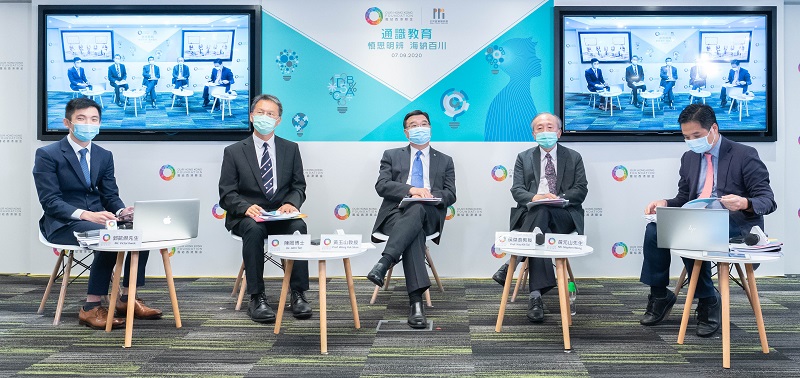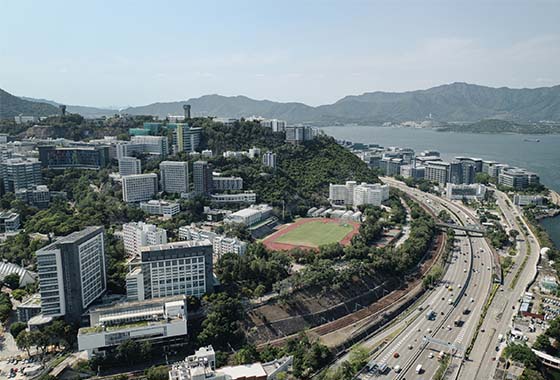Our Hong Kong Foundation Launches Liberal Studies Research Report:
Cultivating Interdisciplinary Learning, Thinking Skills, and Appreciation of Diversity
(7 September, 2020, Hong Kong) Our Hong Kong Foundation (OHKF) has released its latest research report on Liberal Studies. Entitled Liberating Liberal Studies: Cultivating Interdisciplinary Learning, Thinking Skills and Appreciation of Diversity, the Report points out that Liberal Studies has largely failed to realise its initial vision from the curriculum reform, i.e. fostering innovation in society’s future development, due to inadequacies in aspects such as curriculum design and assessment framework. OHKF recommends the Hong Kong SAR Government to revamp Liberal Studies, such that future generations can build cross-disciplinary knowledge, learn to think independently, and appreciate different viewpoints.
Well-Meaning Vision a Let-down
Liberal Studies is a key milestone in local education: as an HKDSE core subject under the New Senior Secondary (NSS) curriculum, more than 550,000 students have taken it since 2009. It was created to expand younger generations’ knowledge bases, cultivate higher-order thinking skills, and broaden their horizons.
Lofty ambitions notwithstanding, it is an insurmountable challenge to attain these objectives while developing a fair scoring standard for university entry all in one singular subject. Educators differ in their interpretations of the overly broad and indefinite curriculum, further complicating the teaching and learning process.
Innovation in education necessitates continuous calibration. This Report puts forward detailed recommendations on the subject’s curriculum, assessment, teaching materials, teaching process, and articulation, in hopes of spurring wider discussion and eventually reaching its high-minded objectives.
1. Curriculum: Heavy on Discourse Yet Light on Content, Privileging Humanities over Sciences
Liberal Studies promotes learning through an issue-enquiry approach, hoping that students would acquire thinking skills along the way as they research and discuss issues. However, with the broad range of topics covered and the vague definitions of key concepts in the Liberal Studies Curriculum & Assessment Guide, students often end up with incomplete understandings of the underlying humanities or scientific concepts and fail to thoroughly analyse topics. This is partly because teachers have only 168 teaching hours to deliver 12 broad themes; in other words, students have around 14 hours to master topics such as ‘Science, Technology and Public Health’, ‘Chinese Culture and Modernity’, and ‘Rule of Law and Socio-Political Participation’. A survey jointly conducted by OHKF and Lingnan University’s Public Governance Programme revealed that 68% of teachers perceive that students did not accumulate sufficient knowledge during their junior secondary education to make full use of the issue-enquiry approach, indicating a gap in curriculum progression. OHKF recommends that authorities reorganise and trim curriculum content, define key learning concepts within each unit, and help teachers and students conduct in-depth exploration of issues using an experiential learning approach; this can give students more room to truly engage with each topic.
Additionally, the Liberal Studies curriculum favours humanities at the expense of science, falling short of its aim, ‘Arts for Science, Science for Arts’. OHKF recommends that the Government provide two study options in Liberal Studies, so that students taking humanities subjects can learn more about science and vice versa. This arrangement could help Liberal Studies strike a balance between arts and science in the overall NSS curriculum.
2. Assessment: Current Framework Promotes Examination Techniques Instead of Thinking Skills
Public examination is the main assessment mode for Liberal Studies, requiring argumentative essays similar to language subjects. The stringent time limit incentivises rehearsed frameworks rather than having students to think through their responses on the spot. The common practice of drilling past papers also does nothing to instil higher-order thinking and instead limits students’ imagination. Implementing open-ended essay questions introduces the possibility of subjective judgment in marking, making it difficult to grade students’ performance fairly; in fact, the struggle to categorise students’ higher-order thinking skills with grades is a worldwide conundrum. 97% of teachers and principals surveyed believe that students with better language skills enjoy an advantage when taking Liberal Studies exams. OHKF’s answer is to ensure impartiality and versatility in current assessment mechanisms; we recommend replacing the subject’s seven-point grading scale with a pass or fail system and introducing alternative modes of assessment rather than essay writing.
Curriculum and assessment development requires increased collaboration amongst committees under the Education Bureau, Curriculum Development Council, and the Hong Kong Examinations and Assessment Authority. OHKF proposes that the Government review the nomination and the feedback mechanisms of said committees to enhance their work in concert. The Government should also ensure that the development aims of the curriculum and the assessments are consistent, so as to avoid having one dominate the other.
3. Teaching Materials: Lack of Effective Supervision
In order to promote analysis from multiple perspectives and implement the issue-enquiry approach to learning, the Curriculum & Assessment Guide discourages the use of textbooks in teaching. Nonetheless, about 87% of teachers admitted that they relied on textbooks as their main teaching materials, highlighting the impracticality of the idea. Equally problematic is the absence of a vetting system for Liberal Studies textbooks and supervision of their context by the Education Bureau. OHKF advocates that the Government publish vetting guidelines for reviewing textbooks and supplementary materials attached therewith.
The Report finds that textbooks aside, there is a limited supply of instructive e-learning materials. Although the Education Bureau does provide some online resources through HKEdCity, our survey indicates that 84% of teachers think that they are of little to no use. Teachers mostly depend on mass-market resources: a surprising 39% use social media as one of their primary teaching materials, which could severely affect the accuracy and objectivity of content taught in class. OHKF believes that it is infeasible to ask authorities to review all online resources, but the Government could still compile an online database that recommends edifying e-learning materials and review the content regularly to support teachers in developing students’ discernment and cogency.
4. Teaching Processes: Inadequate Support for Teachers
Liberal Studies requires teachers cover topics in humanities, sciences, business, and so on, and they are further burdened with a need for variation in teaching materials. Our survey shows that the median lesson preparation time required for Liberal Studies classes is 50% higher than that for other subjects. Some 76% of teachers believe that Liberal Studies asks too much of them, signifying that more support is needed.
OHKF proposes that the Government publish teaching manuals which outline the knowledge and skills teachers should possess, and combine this with feedback from regular inspections to support teachers in the form of Continuous Professional Development.
5. Articulation: Mandating Liberal Studies for University Entry Conflicts with its Design
The HKDSE leaves no room for do overs; as a result, even small differences in students’ Liberal Studies grades affect whether they can get into their desired tertiary institutions and majors. Liberal Studies’ status as a mandatory subject with a seven-point grading scale conflicts with its aims to cultivate thinking skills and reduce rote memorisation. 75% of surveyed school principals think that it is worth serious consideration whether Liberal Studies should be a mandatory or elective subject, whether it should be part of the public exam, and whether the seven-point grading scale should be replaced with a fail or pass system.
The teaching goals of Liberal Studies, such as higher-order thinking skills, self-learning abilities, and respect for others’ perspectives, are all integral to fostering young talent and to Hong Kong’s future in education. There should be no question of withdrawing its compulsory status; however, OHKF holds that the prevailing grading scale should be replaced with a pass or fail system. Specific grades should not be considered in students’ articulation to university via the Joint University Programmes Admissions System (JUPAS) beyond a required pass, allowing students to refocus on the learning process instead of exam results and thereby fully realise Liberal Studies’ purpose.
Professor Yuk-shan Wong, President of the Open University of Hong Kong, opined, ‘The current Liberal Studies curriculum is ill-defined, poorly structured, and overly focused on current affairs. Students’ tendencies to criticise without sufficient reasoning not only proves that one is narrow-minded, but also evinces a dearth of independent thinking. A major revamp of this subject is needed so that young people can acquire critical thinking skills and an open mind.’
Stephen Wong, Deputy Executive Director and Head of Public Policy Institute of OHKF, remarked, ‘Educational innovation ought to be evolutionary. We must constantly adjust and update teaching and assessment mechanisms in tandem with social trends to fulfil the aims and values of this subject.’
Victor Kwok, Head of Education and Youth of OHKF, observed that, ‘The subject design should encourage students to enjoy the learning process rather than focusing on the examination framework. The aspirations of Liberal Studies can only be achieved if students can apply what they have learned in the contexts of their own lives.’
Full report of Cultivating Interdisciplinary Learning, Thinking Skills, and Appreciation of Diversity:
Chinese version: https://bit.ly/2Zd4tEO
English version: https://bit.ly/3hash2h
Cultivating Interdisciplinary Learning, Thinking Skills, and Appreciation of Diversity report launch:
Virtual press conference: https://youtu.be/KMFw8JxpErg?t=803
